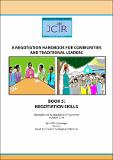October 2022 third Negotiation Handbook for Communities and Traditional Leaders: Negotiation Skills

View/
Date
2016-10-30Authors
Jesuit Centre for Theological Reflection
Nyirongo, Griffin
Type
BookLanguage
enItem Usage Stats
58
views
views
20
downloads
downloads
Abstract
This Book is the third in a series of three books that together constitute the “Negotiation Handbook
for Communities and Traditional Leaders”. The series of books is a product of the JCTR partnership with
Diakonia and the Embassy of Sweden, under which the JCTR has been implementing the Strengthened
Accountability Programme (SAP) in Solwezi in the North Western Province since 2014. One of the activities
under the SAP was to produce a negotiation handbook for communities and traditional leaders to help them
negotiate with local authorities and corporates. The series contributes to meeting the project outcome:
“Targeted corporate sector acts transparently, are accountable to the rights holders, and contribute to
socio – economic justice in targeted districts of North Western Province.” Book 3 (Negotiation Skills) defines negotiations and outlines the negotiating process that the leaders and communities should follow in negotiating and making demands with the duty bearers including the mining firms and local authorities. This book should be read together with Book 1 (Citizens Rights and Responsibilities) and Book 2 (Obligations of Corporates) which provide the information that the traditional leaders and community members need to know,on human rights and corporate social responsibility, respectively, to help them engage government and corporates.
Description
The negotiation handbook is a tool to be used by traditional leaders and their communities to enable
them to demand accountability from local state institutions and compel corporates to demonstrate good
corporate citizenship. The handbook will help traditional leaders, community leaders and members so that
they can represent their communities and participate in making the decisions that affect them and to raise
awareness of important issues when dealing with local and national government, and the large companies
that operate in their areas.